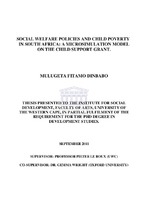| dc.description.abstract | The study assessed the extent of child poverty in South Africa using five different policy scenarios, and modelled the impact on poverty and inequalities of people living in households with children using the Foster-Greer-Thorbecke (FGT) index of poverty measurement, including poverty rate P0, (headcount index ratio), poverty gap index P1, (the depth of poverty), and the severity of poverty P2 (squared poverty gap index). Societal welfare inequalities have been measured using the Gini co-efficient. In general, the scenario analysis was based on the 2007 population baseline and 2008 government policy rules. The results of the study clearly indicate that there is a positive correlation between cash transfer (Child Support Grant) and a reduction in poverty and the inequalities of people living in households with children in South Africa. An increase in the Child Support Grant amount and the number of child beneficiaries, in modelling, produced a positive effect in addressing increasing child poverty and vulnerability. In addition, the research process identified four interrelated gaps that hinder the successful implementation of the social welfare policies underlying the Child Support Grant to reduce the poverty and inequality profile of people living in households with children in South Africa. First, inadequate understanding of the constitutional rights of the child exists. Second, failure to use proven best practice of institutional arrangements and implementation modalities was identified. Third, lack of political will for the championship of a universal basic income grant (UBIG) is present. Fourth, insufficient research, monitoring and evaluation (M&E) and dissemination of best practices is done. Within the context of the above mentioned analysis, the study finally brings into focus general observations gained from the investigation and provides recommendations to policy makers and other stakeholders. | en_US |

